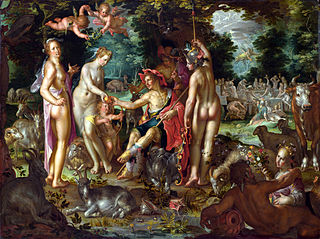Mythology: The Judgement of Paris
It is recounted that Zeus held a banquet in celebration of the marriage of Peleus and Thetis (parents of Achilles). However, Eris, goddess of discord was not invited, for she would have made the party unpleasant for everyone. Angered by this snub, Eris arrived at the celebration with a golden apple from the Garden of the Hesperides, which she threw into the proceedings, upon which was the inscription καλλίστῃ (kallistēi, “for the fairest one”).
Three goddesses claimed the apple: Hera, Athena and Aphrodite. They asked Zeus to judge which of them was fairest, and eventually he, reluctant to favour any claim himself, declared that Paris, a Trojan mortal, would judge their cases, for he had recently shown his exemplary fairness in a contest in which Ares in bull form had bested Paris’s own prize bull, and the shepherd-prince had unhesitatingly awarded the prize to the god.
Thus it happened that, with Hermes as their guide, the three candidates bathed in the spring of Ida, then confronted Paris on Mount Ida in the climactic moment that is the crux of the tale. While Paris inspected them, each attempted with her powers to bribe him; Hera offered to make him king of Europe and Asia, Athena offered wisdom and skill in war, and Aphrodite, who had the Charites and the Horai to enhance her charms with flowers and song (according to a fragment of the Cypria quoted by Athenagoras of Athens), offered the world’s most beautiful woman (Euripides, Andromache, l.284, Helena l. 676). This was Helen of Sparta, wife of the Greek king Menelaus. Paris accepted Aphrodite’s gift and awarded the apple to her, receiving Helen as well as the enmity of the Greeks and especially of Hera. The Greeks’ expedition to retrieve Helen from Paris in Troy is the mythological basis of the Trojan War.
The theme of the Judgement of Paris naturally offered artists the opportunity to depict a sort of beauty contest between three beautiful female nudes, but the myth, at least since Euripides, rather concerns a choice among the gifts that each goddess embodies. The bribery involved is ironic and a late ingredient.
According to a tradition suggested by Alfred J. Van Windekens, objectively, “cow-eyed” Hera was indeed the most beautiful, not Aphrodite. However, Hera was the goddess of the marital order and of cuckolded wives, amongst other things. She was often portrayed as the shrewish, jealous wife of Zeus, who himself often escaped from her controlling ways by cheating on her with other women, mortal and immortal. She had fidelity and chastity in mind and was careful to be modest when Paris was inspecting her. Aphrodite, though not as objectively beautiful as Hera, was the goddess of sexuality, and was effortlessly more sexual and charming before him. Thus, she was able to sway Paris into judging her the fairest. Athena’s beauty is rarely commented in the myths, perhaps because Greeks held her up as an asexual being, being able to “overcome” her “womanly weaknesses” in order to become both wise and talented in war (both considered male domains by the Greeks). Her rage at losing makes her join the Greeks in the battle against Paris’ Trojans, a key event in the turning point of the war.
Information provided by: http://en.wikipedia.org/wiki/Judgement_of_paris

